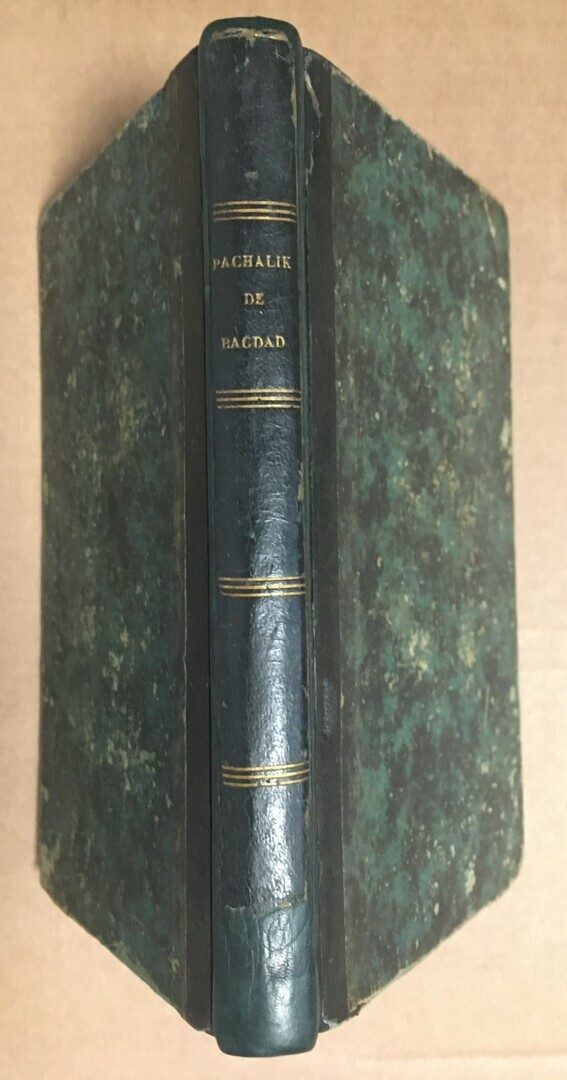Description du Pachalik de Bagdad, suivie d’une Notice Historique sur les Wahabis, et de quelques autres pièces relatives à l’Histoire et à la Littérature de l’Orient.
ROUSSEAU, JEAN-BAPTISTE-LOUIS-JACQUES.
Synopsis
The author, cousin of the eighteenth century French philosopher Jean-Jacques Rousseau, was Consul-General of France in Aleppo when these memoirs of a trip from Baghdad to Aleppo were written in 1808. He also served as Consul-General of France in Basra and Tripoli where he died.
This important historical document which remained unedited until 1899, completes his “Extrait d’un itinéraire en Perse par la voie de Bagdad”, and is supposed to be part of his correspondence with Barbie du Bocage (1760-1825) who was a member of the Institut de Belles-Lettres, which the author joined later in his life. As a keen and conscientious observer of the Orient, his notes describe for us the remnants of the past.
His family background takes us back first to his grandfather Jacques Rousseau who, in 1705, joined the delegation sent by Louis the XIV to Persia to meet the Shah Hussain. There he established himself as the crown jeweller. From there, his father Xavier took refuge in Bandar Abbas where he was nominated as the commercial attaché of France in the area, then as a temporary Consul to Baghdad and Basra, and was later exiled by the Turks as the Consul of France to Basra. He was freed in 1803 by his friend Sulayman Pacha and was appointed in 1805 Consul of France in Baghdad and his son, the author himself, as the Consul of France in Basra.
In 1808 trying to re-establish a sort of diplomatic relations with Persia, the author sent a manuscript referring to the passage of the French Army through Turkey and Persia on its way to India. This project seems to prove that Napoleon had the intention of curtailing the English in India with the help of the Russian Tsar.
Upon the death of his father in Aleppo in 1808, the author wrote these observations in his “caravanning trip” to reunite with his mother. It should be noted that at a later date in his diplomatic career he was stationed in Tripoli where he founded a magazine called “l’Instigateur Africain”. He was also a major collector of old Arabic manuscripts, which he sold (500 of them) to the Tsar. He died in 1831 as a Baron and member of the Académie de Literature.
This work was anonymously edited and annotated by the great French Orientalist Silvestre de Sacy. The appendix contains Rousseau’s ground breaking “Notice sur les Wahabis”, as well as a “Notice sur les Yézidis” by Maurizio Garzoni, who had spent 18 years in Kurdistan, translated into French by de Sacy. The volume is concluded by a series of “Poésies Persanes”, translated by Rousseau.
Rousseau and The Wahhabis
Jean-Baptiste Rousseau was the French Consul at Basra in 1805. He held diplomatic positions in Aleppo and Tripoli in 1908.
His position in Basra was rich in promoting French interest vis a vis the competing British interests. He studied the condition of the Arab tribes in Iraq and in Arabia. He had extensive information about Islamic sects and political movements. Accordingly, he was an authority on these subjects during that early period of the 19th century. He published the following titles on the above subject:
1- Description du pachalik de Bagdad, suivi d’une Notice historique sur les Wahabis, Paris, 1809.
2- Mémoire sur trois plus fameuses sectes du musulmanisme, les Wahabis, les Nosaïris et les Ismaélis, Paris, 1818.
Rousseau gathered lot of information covering the political and military incidents of that period. In the first title Rousseau gives a brief history of the Wahabi history, customs and believes. His most important contribution was that he was one of the first European scholars and diplomats who reported in detail the Wahhabi occupation of Karbala occurred on 21 April 1802 (1216 H), under the rule of Abdulaziz bin Muhammad the second ruler of the First Saudi State.
The Wahhabi raid was conducted in retaliation against attacks on Hajj caravans by Iraqi tribes. The attack lasted for eight hours, after which the Wahhabis left the city with more than 4,000 camels carrying their plunder.
It is worth noting that all European Orientalists and historians who discussed the history of the Wahhabi movements, have copied many information and incidents mentioned by Rousseau in his book.
While living in Aleppo, Rousseau continued to gather first-hand information about the Wahabis movement from Yemen to Najd. In a long chapter (pages 123 to 182 ), Rousseau talks about the Origins of the Wahabis, history of Sheik Muhammed Ibn Abdul-Wahab and Ibn Saud. The Religion of the Wahabis and their beliefs. Then mentions the first expedition of the Pasha of Baghdad against the Wahabis. The attacks in Persia; The situation of the Wahabis after the death of Abdul Aziz, the first expedition of Saud. The First attack against Basrah, the death of Imam of Muscat. The travels through Syria and Egypt to spread the new religion; The control of Madinah, the pilgrimage in Mekka. The attack of Imam Ali of Zubair and Samawa; The situation of the Wahabis and their neighbour provinces in 1807. Main incidents in 1809, the attack of the Wahabis against Syria and Egypt. The last attack of the Wahabis against Baghdad, the defeat of Al Kawasim. Also, he recorded his own reflection on the Wahabis.
He finished with extracts from letters from Aleppo and Bagdad mentioning pilgrims and how they were stopped from going to Mecca. It’s a rare document about the Wahabi movement in Arabia.
Bibliographic references: Macro, Bibliography of the Arabian Peninsula, 1962; Wilson 194; Quérard VIII, 233; OCLC 7034932; Cf. Henze IV, 685; Awad al-Alouchi: A Bibliography of Baghdad 835.








